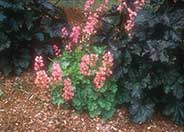
Common name:Coral Bells
Botanical name:Heuchera cultivars
These perennials have wonderful flowers in colors ranging from white to deep crimson. The flowers bloom in spring and these plants are popular in masses or borders.

Common name:Beach Strawberry, Sand Strawberry
Botanical name:Fragaria chiloensis
This perennial grows 4"-8" high with tooth-edged leaves and ornamental strawberries during the fall. Cut back or mow in early spring to encourage new growth.

Common name:Dusty Miller, Silver Groundsel
Botanical name:Senecio cineraria
The Dusty Miller exhibits growth to 1' or more, with velvet gray leaves that have broad, roundish lobes. Yellow flower heads appear through the middle of the plant during most months of the year. Cut heads back occasionally to encourage bushiness.
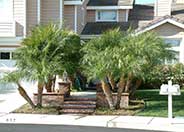
Common name:Pygmy Date Palm, Roebelin Palm
Botanical name:Phoenix roebelenii
This tree will grow to about 10' tall and has dark green, spiny petiole foliage. It does well in full sun to heavy shade; it likes moderate to heavy irrigation, but can take periods of dryness.
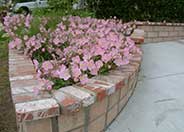
Common name:Pink Mexican Evening Primrose
Botanical name:Oenothera speciosa 'Roseum'
Oenothera speciosa 'Rosea' is a perennial ground cover. It grows 10"-12" high, with profuse showing of 1.5" wide rose pink blooms in summer. Flowers open in daytime and stems die back after bloom. It can be highly invasive.
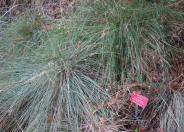
Common name:California Fescue
Botanical name:Festuca californica
The California Fescue is a cool season bunchgrass with blue green blades that reach 2'-5' high and 3' wide. Foliage arches gracefully upwards and outwards. Flower spikes reach 3' above the leaves. Plant in full sun or partial shade. It makes a great companion plant to oak trees and is handsome as a backdrop behind lower growing grasses for a meadow look. The California fescue is native to California and is a beneficial insect plant.
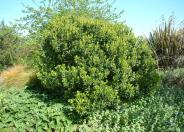
Common name:California Coffeeberry
Botanical name:Frangula californica
The California coffeeberry is an evergreen shrub that reaches 6'-8' high. It grows inland and has large green to black berries in late summer. This shrub tolerates sun or partial shade in all soil types. The California coffeeberry is a native to California and is drought tolerant. It is a beneficial insect plant and attracts butterflies.
Designer: Terry LePage
Photographer: GardenSoft
Incorporate compost 6" into your soil to retain water, reduce compaction, feed earthworms, and provide valuable nutrients to your plants.
Adjust sprinklers to avoid watering sidewalks and driveways.
Drip and other smart irrigation delivers water directly to roots, allowing no excess water for weeds.